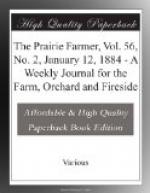By the introduction of barbed wire an important change is likely to take place in planting hedges. Barbed wire makes a cheaper fence for its efficiency than any other material. A serious objection to it is the danger of animals being lacerated against it, the wires being nearly invisible. This objection may be obviated by inclosing the wires in visible hedges. Efficiency may also be thus imparted to small-growing hedge plants, such as privet, barberry and small evergreens, which will require but little labor in pruning and would become handsome ornaments. The purple barberry, for example, would present an attractive appearance during a large portion of the year. A new value may thus be given to hedges by rendering moderate growers and those easily kept in shape efficient barriers for farm and fruit gardens.
YOUNG MEN WANTED.
Perhaps one of the greatest needs of horticulture at the present day, is young men to engage in the work—intelligent, patient, energetic young men, who will begin and make it a life-labor and study. What nobler employment in which young men can engage? What field for study and investigation can be found for them which offers a more gratifying and pleasant pursuit, and promises richer and more substantial results?
There are so many open questions connected with the science; so many points that need investigation, so many problems to be solved; so much to learn that is yet unknown—that the needs for more laborers are great and pressing; and the wonder is that more of our young men are not entering upon the work.
That young men are needed, rather than the old or middle aged, is because many of the investigations to be undertaken require a lifetime to perfect, and can only be brought to a profitable issue in a long series of years. Such, for instance, as the production of new varieties of fruits; the relative hardiness and longevity of trees; the effects of soil and climate, heat, cold, etc., upon plant life; the degeneracy of species, etc.;—all of which require a long series of experiments to determine. Older men, here and there, are engaged in these investigations; but they are passing away in the midst of their work only partially accomplished, and their labors are thus in a degree lost.
Our farmers’ sons—stout, healthy, energetic young men—are the ones upon whom this labor and high duty more properly devolves. To them belongs, or should belong, the honor and glory of pushing forward this noble work. Many of these, however, are mistakenly leaving the farms to engage in trade and speculation; while others who remain at home mostly incline to other branches. The agricultural colleges are doubtless developing a few faithful workers for these too neglected fields; but these munificently endowed institutions are believed to fall far short of their duty in this respect.
I will close by recommending this matter to the thoughtful consideration of the young readers of THE PRAIRIE FARMER, who, as a class, I believe to be as capable and intelligent as the country affords, and with the remark that I know of no business in life to which I would sooner urge any young friend of my own to devote his talents and his energies.




